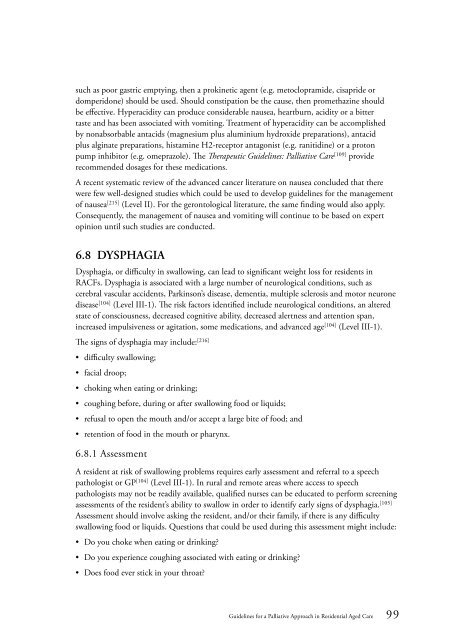Guidelines for a Palliative Approach in Residential Aged Care
Guidelines for a Palliative Approach in Residential Aged Care
Guidelines for a Palliative Approach in Residential Aged Care
Create successful ePaper yourself
Turn your PDF publications into a flip-book with our unique Google optimized e-Paper software.
such as poor gastric empty<strong>in</strong>g, then a prok<strong>in</strong>etic agent (e.g. metoclopramide, cisapride or<br />
domperidone) should be used. Should constipation be the cause, then promethaz<strong>in</strong>e should<br />
be effective. Hyperacidity can produce considerable nausea, heartburn, acidity or a bitter<br />
taste and has been associated with vomit<strong>in</strong>g. Treatment of hyperacidity can be accomplished<br />
by nonabsorbable antacids (magnesium plus alum<strong>in</strong>ium hydroxide preparations), antacid<br />
plus alg<strong>in</strong>ate preparations, histam<strong>in</strong>e H2-receptor antagonist (e.g. ranitid<strong>in</strong>e) or a proton<br />
pump <strong>in</strong>hibitor (e.g. omeprazole). The Therapeutic <strong>Guidel<strong>in</strong>es</strong>: <strong>Palliative</strong> <strong>Care</strong> [109] provide<br />
recommended dosages <strong>for</strong> these medications.<br />
A recent systematic review of the advanced cancer literature on nausea concluded that there<br />
were few well-designed studies which could be used to develop guidel<strong>in</strong>es <strong>for</strong> the management<br />
of nausea [215] (Level II). For the gerontological literature, the same f<strong>in</strong>d<strong>in</strong>g would also apply.<br />
Consequently, the management of nausea and vomit<strong>in</strong>g will cont<strong>in</strong>ue to be based on expert<br />
op<strong>in</strong>ion until such studies are conducted.<br />
6.8 DYSPHAGIA<br />
Dysphagia, or difficulty <strong>in</strong> swallow<strong>in</strong>g, can lead to significant weight loss <strong>for</strong> residents <strong>in</strong><br />
RACFs. Dysphagia is associated with a large number of neurological conditions, such as<br />
cerebral vascular accidents, Park<strong>in</strong>son’s disease, dementia, multiple sclerosis and motor neurone<br />
disease [104] (Level III-1). The risk factors identified <strong>in</strong>clude neurological conditions, an altered<br />
state of consciousness, decreased cognitive ability, decreased alertness and attention span,<br />
<strong>in</strong>creased impulsiveness or agitation, some medications, and advanced age [104] (Level III-1).<br />
The signs of dysphagia may <strong>in</strong>clude: [216]<br />
• difficulty swallow<strong>in</strong>g;<br />
• facial droop;<br />
• chok<strong>in</strong>g when eat<strong>in</strong>g or dr<strong>in</strong>k<strong>in</strong>g;<br />
• cough<strong>in</strong>g be<strong>for</strong>e, dur<strong>in</strong>g or after swallow<strong>in</strong>g food or liquids;<br />
• refusal to open the mouth and/or accept a large bite of food; and<br />
• retention of food <strong>in</strong> the mouth or pharynx.<br />
6.8.1 Assessment<br />
A resident at risk of swallow<strong>in</strong>g problems requires early assessment and referral to a speech<br />
pathologist or GP [104] (Level III-1). In rural and remote areas where access to speech<br />
pathologists may not be readily available, qualified nurses can be educated to per<strong>for</strong>m screen<strong>in</strong>g<br />
assessments of the resident’s ability to swallow <strong>in</strong> order to identify early signs of dysphagia. [105]<br />
Assessment should <strong>in</strong>volve ask<strong>in</strong>g the resident, and/or their family, if there is any difficulty<br />
swallow<strong>in</strong>g food or liquids. Questions that could be used dur<strong>in</strong>g this assessment might <strong>in</strong>clude:<br />
• Do you choke when eat<strong>in</strong>g or dr<strong>in</strong>k<strong>in</strong>g?<br />
• Do you experience cough<strong>in</strong>g associated with eat<strong>in</strong>g or dr<strong>in</strong>k<strong>in</strong>g?<br />
• Does food ever stick <strong>in</strong> your throat?<br />
<strong>Guidel<strong>in</strong>es</strong> <strong>for</strong> a <strong>Palliative</strong> <strong>Approach</strong> <strong>in</strong> <strong>Residential</strong> <strong>Aged</strong> <strong>Care</strong> 99
















